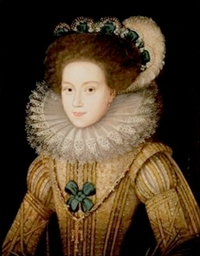by Daniel Hathaway

Margolis having decided to step down, Cantores has entered a new era under a new name: Contrapunctus Cleveland. The mission remains the same, but the artistic leadership has passed on to British countertenor David Acres and soprano Judith Overcash, and Contrapunctus is now in residence at Trinity Cathedral in downtown Cleveland. The newly reconstituted, 19-voice ensemble will make its debut at Trinity on Sunday, March 2 at 3:00 pm in a program entitled “The Life and Times of Mary, Queen of Scots (1542-1587).
We reached David Acres by telephone in Cleveland to ask how he and Contrapunctus found each other. “I was singing at Exeter Cathedral in Devon in 2012 where I had formerly sung as a boy, when the Trinity Chamber Singers were in residence at Wells Cathedral during a week in July. They were down one countertenor and a friend in the Trinity group recommended me.” Acres and the Cleveland singers got on splendidly together. “Within 24 hours we were like long-lost chums!”
Overcash and Trinity’s music director, Todd Wilson, were instrumental in suggesting that Acres pursue opportunities in the States. “I was offered a lot of singing there and I thought, why not? It was a time in my life when I could do with a nice change. I was trundling along singing all over Europe, living out of a suitcase. I was thinking about putting down roots but didn’t know how I was going to do it.”
Acres came to Cleveland last fall and started singing at Trinity Cathedral and with Quire Cleveland, just about the time that Margolis decided to hand the reins of Cantores Cleveland over to Overcash. Since Acres had spent the last 25 years conducting a similar ensemble called Counterpoint in the U.K., one thing led to another quite smoothly, especially since Acres had decided two decades ago to create thematic concerts which placed music in its historical context.

The choice of Mary, Queen of Scots as a theme requires a bit of explanation. “It’s an odd one, isn’t it!”, Acres admits, going on to note that many people confuse the two Marys who figured in the turbulent history of the English Reformation and Counter-Reformation. “Mary, Queen of Scots wasn’t ‘Bloody Mary,’ the daughter of Henry VIII, but the first cousin of Elizabeth I, once removed. She got a lot of bad press from the Anglicans. This Mary lived in Scotland, France, Spain and the Netherlands — cultures that were fabulous exponents of Renaissance music — and her life was full of pathos and intrigue.
“Her enemies portrayed her as ‘a mare of a woman,’ but she was six feet tall and very elegant. We have an actress, Denise Larkin, who will bring Mary to life in her letters and prayers. She comes across as very much of a manipulated woman.” And Contrapunctus will wrap music by De Rore, Lobo, Victoria, Palestrina, the Scottish Robert Johnson, Costeley, Tallis and Byrd and others around those literary pieces. Trinity’s assistant organist, Elizabeth Lenti, will add short organ pieces by Tallis and Cabezón and Byrd, which Acres notes “can be either melancholy or jaunty.”
David Acres promises that Sunday’s concert will be something out of the ordinary. “Unusual pieces that you don’t regularly hear, beautifully sung to a very high standard. That together with Mary’s own words and color paintings of the period in the program books should prove to be a winning combination.”
Published on ClevelandClassical.com February 27, 2014
Click here for a printable version of this article.



